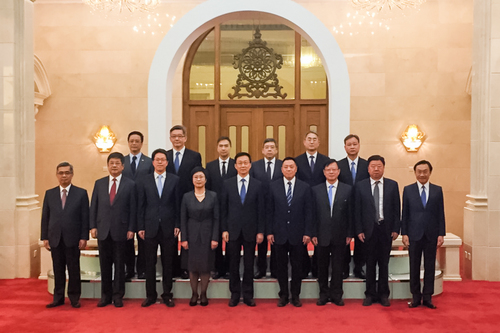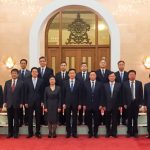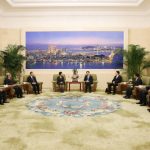 Vice Premier of the State Council, Mr Han Zheng, poses for a group photograph with the principal officials of the Macao SAR Government and the Public Prosecutor-General who are attending training sessions in Beijing.
Vice Premier of the State Council, Mr Han Zheng, poses for a group photograph with the principal officials of the Macao SAR Government and the Public Prosecutor-General who are attending training sessions in Beijing.
Vice Premier of the State Council, Mr Han Zheng, affirmed the Macao Government’s work in adhering to the principle of “One country, two systems” and its pursuit of long-term prosperity for Macao while maintaining social stability and unity.
Mr Han, also a member of the Standing Committee of the Political Bureau of the CPC Central Committee, made the comments as he met in Beijing on Monday (23 April) the Macao Special Administrative Region (MSAR) Government’s principal officials and Macao’s Public Prosecutor-General. The Macao officials have been collectively attending training sessions in the capital.
Vice Premier Han called upon the 10 senior officials from Macao to act steadfastly in response to President Xi Jinping’s guidance regarding Macao’s development.
During the meeting, Mr Han raised with the MSAR Government officials four aspirations, said the Secretary for Administration and Justice, Ms Chan Hoi Fan. She made the comments to reporters in Beijing after the meeting.
The four aspirations were: 1) comprehensive and accurate implementation of the Basic Law and the principle of “One country, two systems”; 2) safeguarding of the nation’s sovereignty, security and its development interests; 3) to make further effort to diversify the city’s overall economy in line with the city’s distinctive features as well as integrating Macao’s development with overall national development; and 4) to strive to enhance social well-being, listen to the people and improve any shortcomings in administration.
Ms Chan said the Vice Premier had affirmed the current efforts of the Chief Executive and his governance team. She added the Macao Government would dedicate further efforts to strengthening governance according the aspirations outlined by the Vice Premier.
She noted that the meeting was Mr Han’s first public encounter with people from either of the two SARs since he took on responsibility for Central Government oversight of Hong Kong and Macao affairs last year. The meeting reflected the fact the Central Government attached great importance to Macao’s development, Ms Chan stated.
The MSAR Government officials have been attending training courses in Beijing at the Chinese Academy of Governance.
Ms Chan said the training programme was of great importance to the officials in terms of enhancing local governance and gaining better insights on Xi Jinping Thought on Socialism with Chinese Characteristics for a New Era, as well as development of the country’s relations with other countries.
Central Government officials attending Monday’s meeting included: the Director of the Hong Kong and Macao Affairs Office of the State Council, Mr Zhang Xiaoming; Deputy Secretary-General of the State Council, Mr Ding Xuedong; and the Director of the Liaison Office of the Central People’s Government in the MSAR, Mr Zheng Xiaosong.
MSAR Government principal officials present at Monday’s meeting were: the Secretary for Administration and Justice Ms Chan Hoi Fan; the Secretary for Economy and Finance Mr Leong Vai Tac; the Secretary for Security Mr Wong Sio Chak; the Secretary for Social Affairs and Culture Mr Tam Chon Weng; the Secretary for Transport and Public Works Mr Raimundo Arrais do Rosario; the Commissioner Against Corruption Mr Cheong Weng Chon; the Commissioner of Audit Mr Ho Veng On; the Commissioner-General of the Unitary Police Service Mr Ma Io Kun; the Director-General of the Macao Customs Service Mr Vong Iao Lek; and the Public Prosecutor-General Mr Ip Son Sang.
View gallery


